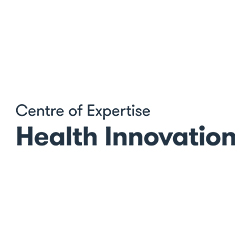De Haagse Labs zijn leer- en experimenteeromgevingen van het Kenniscentrum Health Innovation i.o. Het zijn fysieke labs en real-life omgevingen, binnen en buiten de hogeschool, waar eindgebruikers, zoals kinderen, ouderen en zorgprofesslonals, centraal staan. Door het slim verbinden van onze kennis en expertise in onderzoek en onderwijs met die van onze partners, gaan we samen de uitdagingen rondom gezondheid aan. Dit doen we door doelgericht, experimenterend en lerend te innoveren! Binnen de labs bundelen we ook vanuit de hogeschool de kennis en krachten. Voor elke vraag uit de praktijk stellen we een multidisciplinair team van experts uit verschiiiende lectoraten en opleidingen samen. We betrekken niet alleen inhoudsdeskundigen, maar ook ontwerpers en technici (in spe).
DOCUMENT

Het boek ‘Create Health Ways of Working: Insights from ten eHealth innovation research projects’ presenteert inzichten uit het meta-onderzoeksproject ‘Create & Health Innovation WAys of Working Analysis’, ook wel CHIWAWA genoemd. Binnen dit meta-onderzoeksproject inventariseerden onderzoekers van de Hogeschool Utrecht (Lectoraat Onderzoekend Vermogen en Lectoraat Co-design) het gebruik van creatieve manieren van werken bij innovatieprocessen in de zorg, waarvoor zij tien onderzoeksprojecten van Nederlandse kennisinstellingen volgende in de periode 2018 – 2022. Deze tien onderzoeksprojecten en het meta-onderzoek waren onderdeel van het ZonMw-programma Create Health. Het boek presenteert case-portretten van de tien onderzoeksprojecten naar eHealth innovatie die zich concentreerden rondom de thema’s dementie, eenzaamheid en overgewicht. Vervolgens geeft het boek verdieping met betrekking tot de creatieve manieren van werken in de tien Create Health-onderzoeksprojecten, begrip van relationele processen bij het creëren van kennisuitwisseling en zicht op de impact die een dergelijke samenwerking heeft op de zorg- en welzijnssector en op de creatieve industrie. Het boek bevat aanbevelingen voor toekomstige onderzoeksconsortia, financiers en de praktijk (creatieve industrie, zorgsector en doelgroep) en sluit af met de beschrijving van een tool die gebaseerd is op het Research Pathway Model, dat als instrument gebruikt kan worden om het gesprek tussen stakeholders van innovatieprocessen in de zorg te ondersteunen.
DOCUMENT

This article focuses on the opportunities and challenges Dutch Small and Medium sized Enterprises (SMEs) in the food and beverage industry are facing with respect to innovation in food and health. An online questionnaire was developed to give an overview on attitudes and activities of SMEs with respect to innovation; their interest in trends, among which were health and wellbeing; and their view on logos as a possible way of communication. Results show that innovation is important for SMEs: over 80% of the SMEs are innovating in products and over 60% in processes. The most appealing trends are: Health and wellbeing and sustainability. In conclusion, the identified opportunities for innovation in food and health are: a large willingness to innovate and the increasing interest in the already appealing trend of nutrition and health. Also, taste is considered as important as health and cannot be compromised.
LINK
As the Dutch population is aging, the field of music-in-healthcare keeps expanding. Healthcare, institutionally and at home, is multiprofessional and demands interprofessional collaboration. Musicians are sought-after collaborators in social and healthcare fields, yet lesser-known agents of this multiprofessional group. Although live music supports social-emotional wellbeing and vitality, and nurtures compassionate care delivery, interprofessional collaboration between musicians, social work, and healthcare professionals remains marginal. This limits optimising and integrating music-making in the care. A significant part of this problem is a lack of collaborative transdisciplinary education for music, social, and healthcare students that deep-dives into the development of interprofessional skills. To meet the growing demand for musical collaborations by particularly elderly care organisations, and to innovate musical contributions to the quality of social and healthcare in Northern Netherlands, a transdisciplinary education for music, physiotherapy, and social work studies is needed. This project aims to equip multiprofessional student groups of Hanze with interprofessional skills through co-creative transdisciplinary learning aimed at innovating and improving musical collaborative approaches for working with vulnerable, often older people. The education builds upon experiential learning in Learning LABs, and collaborative project work in real-life care settings, supported by transdisciplinary community forming.The expected outcomes include a new concept of a transdisciplinary education for HBO-curricula, concrete building blocks for a transdisciplinary arts-in-health minor study, innovative student-led approaches for supporting the care and wellbeing of (older) vulnerable people, enhanced integration of musicians in interprofessional care teams, and new interprofessional structures for educational collaboration between music, social work and healthcare faculties.
Developing a framework that integrates Advanced Language Models into the qualitative research process.Qualitative research, vital for understanding complex phenomena, is often limited by labour-intensive data collection, transcription, and analysis processes. This hinders scalability, accessibility, and efficiency in both academic and industry contexts. As a result, insights are often delayed or incomplete, impacting decision-making, policy development, and innovation. The lack of tools to enhance accuracy and reduce human error exacerbates these challenges, particularly for projects requiring large datasets or quick iterations. Addressing these inefficiencies through AI-driven solutions like AIDA can empower researchers, enhance outcomes, and make qualitative research more inclusive, impactful, and efficient.The AIDA project enhances qualitative research by integrating AI technologies to streamline transcription, coding, and analysis processes. This innovation enables researchers to analyse larger datasets with greater efficiency and accuracy, providing faster and more comprehensive insights. By reducing manual effort and human error, AIDA empowers organisations to make informed decisions and implement evidence-based policies more effectively. Its scalability supports diverse societal and industry applications, from healthcare to market research, fostering innovation and addressing complex challenges. Ultimately, AIDA contributes to improving research quality, accessibility, and societal relevance, driving advancements across multiple sectors.
Centre of Expertise, onderdeel van De Haagse Hogeschool
